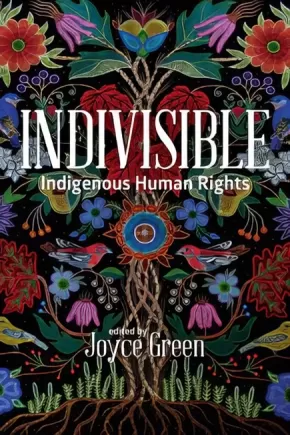Joyce Green
Joyce Green is associate professor of political science at the University of Regina. Green’s work focuses on the politics of decolonization in Canada; on identity, human rights and citizenship; and on the way in which sexism, racism and race privilege is encoded in Canadian political culture. She is is of English, Ktunaxa and Cree-Scots Métis descent.
Books (2)
Synopsis:
Indigenous rights are generally conceptualized and advocated separately from the human rights framework. The contributors to Indivisible: Indigenous Human Rights, however, deftly and powerfully argue that Indigenous rights are in fact human rights and that the fundamental human rights of Indigenous people cannot be protected without the inclusion of their Indigenous rights, which are suppressed and oppressed by the forces of racism and colonialism. Drawing on a wealth of experience and blending critical theoretical frameworks and a close knowledge of domestic and international law on human rights, the authors in this collection show that settler states such as Canada persist in violating and failing to acknowledge Indigenous human rights. Furthermore, settler states are obligated to respect and animate these rights, despite the evident tensions in political and economic interests between elite capitalists, settler citizens and Indigenous peoples.
Reviews
“The historic and contemporary challenges faced by Indigenous peoples, be it the tragedy of residential schools, high levels of violence against women, abusive policing, struggles around land and resources, or entrenched poverty are reflective of the disgraceful failure of Canada and other states to uphold human rights. Indivisible is a critical call to governments and Indigenous peoples to take up the indivisible framework of rights protection enshrined in the UN Declaration of the Rights of Indigenous Peoples.” — Alex Neve, Amnesty International
“Well written, fast moving, and well researched, this is book is a rich, smart resource for anyone wanting to break down and understand the human rights versus indigenous rights debate, and to move on to more productive conversations about real political and legal change for indigenous peoples.” — Val Napoleon, University of Victoria
“Have you ever looked back at a point in your life when, had good advice been taken, it would have meant a much better future? This book offers that advice, now. Canadians who want to live well because Indigenous peoples prosper need to read Indivisible.” — Robert Lovelace, Retired Chief of Ardoch Algonquin First Nation, professor of global studies, Queen’s University
Educator Information
Table of Contents
Indigenous Human Rights are Indivisible (Joyce Green)
THEORETICAL AND POLITICAL CONTEXT FOR INDIGENOUS HUMAN RIGHTS
Denying Indigenous Human Rights: Colonialism and Rights Discourse in Canada (Joyce Green)
Two The Race Bind: Denying Aboriginal Rights in Australia (Maggie Walter)
Colonialism Past and Present: Indigenous Human Rights and Canadian Policing (Elizabeth Comack)
Indigenous Human Rights and Decolonization (Andrea Smith)
ABORIGINAL HUMAN RIGHTS — SPECIFIC THEMES
McIvor v. Canada: Legislated Patriarchy Meets Aboriginal Women’s Equality Rights (Gwen Brodsky)
Confronting Violence: Indigenous Women. Self-Determination and International Human Rights (Rauna Kuokkanen)
Victoria’s Secret: How to Make a Population of Prey (Mary Eberts)
INTERNATIONAL AND DOMESTIC CONSTITUTIONAL LAW and INDIGENOUS HUMAN RIGHTS
Free, Prior and Informed Consent: Defending Indigenous Rights in the Global Rush for Resources (Craig Benjamin)
The Presumption of Conformity: International Indigenous Human Rights and the Canadian Constitution (Brenda Gunn)
Undermining Indigenous Peoples’ Security and Human Rights (Paul Joffe)
Additional Information
240 pages | 6.00" x 9.00"
Synopsis:
The first edition of Making Space for Indigenous Feminism proposed that Indigenous feminism was a valid and indeed essential theoretical and activist position, and introduced a roster of important Indigenous feminist contributors. This new edition builds on the success and research of the first and provides updated and new chapters that cover a wide range of some of the most important issues facing Indigenous peoples today: violence against women, recovery of Indigenous self-determination, racism, misogyny and decolonization. Specifically, new chapters deal with Indigenous resurgence, feminism amongst the Sami and in Aboriginal Australia, neoliberal restructuring in Oaxaca, Canada’s settler racism and sexism, and missing and murdered Indigenous women and girls in Canada.
Written by Indigenous feminists and allies, this book provides a powerful and original intellectual and political contribution demonstrating that feminism has much to offer Indigenous women, and all Indigenous peoples, in their struggles against oppression.
Reviews
“Making Space for Indigenous Feminism is an essential resource that places gender justice at the core of our analyses of colonization and decolonization. What we learn is urgent: without addressing the systemic and symbolic character of the gendered violence that Indigenous women, girls, two-spirit, trans, and queer folks disproportionately face, decolonization will remain a man-made, colonial sham.” — Glen Coulthard, First Nations and Indigenous Studies, UBC
“This path-breaking collection brings together leading and emerging voices in the field, presenting critical innovative research that reminds us of the need for a consistent application of feminist analytic tools to understand colonialism and patriarchy as mutually constitutive and reinforcing forces. This collection is essential as an emancipatory tool for decolonization and Indigenous resurgence.” — Heidi Kiiwetinepinesiik Stark, University of Victoria
Additional Information
256 pages | 6.00" x 9.00"








